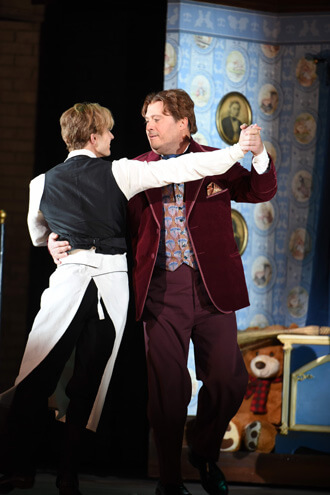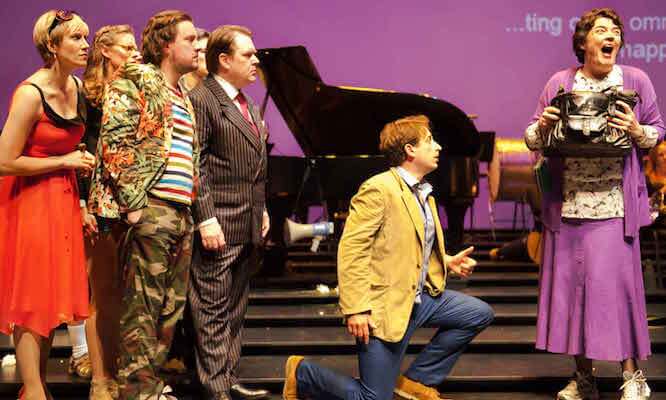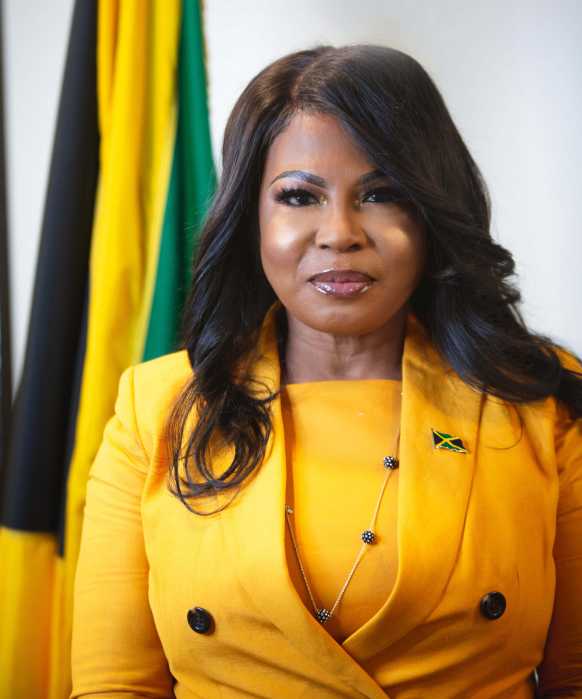Reed Luplau and David Daniels in Theodore Morrison’s “Oscar,” performed by Opera Philadelphia. | KELLY & MASSA/ OPERA PHILADELPHIA
It is never a happy task to criticize a work which is created out of love for the best artistic and social reasons by gifted people –– but good intentions do not automatically make great art. (As well, great artists are not always great or even good human beings outside of their talent.) Theodore Morrison’s “Oscar,” an operatic treatment of the fall, imprisonment, and posthumous rise of Oscar Wilde, premiered in Santa Fe in 2013. Opera Philadelphia gave the work its East Coast premiere this February in a revised version.
John Cox’s literate libretto has been derided as a hagiography. This Wilde is an adorable sweetheart who evolves from man of principle to tragic victim to posthumous divinity alongside Walt Whitman in a literary Parnassus at the final tableau. The less savory aspects of Wilde’s character –– his snobbery, narcissistic sense of entitlement, and hypocrisy –– are not explored. Wilde refuses to flee England because his proud mother told him it would be cowardly and because it is nobler and more beautiful to stay. Wilde is positioned as a martyr, victim, and eventual saint without shades of gray.
Similarly, Wilde’s friends and defenders Frank Harris and Ada Leverson never waver in their virtuous support while his nemeses, prison warden Colonel Henry B. Isaacson and Judge Sir Alfred Wills, are all black-hearted villainy straight out of a Victorian melodrama. Lord Alfred “Bosie” Douglas, a silent role danced by Reed Luplau, is more symbol than human being –– an ideal of romantic gay love that morphs into a seductive death figure –– a homme fatale suggesting that Wilde has a masochistic death wish that isn’t otherwise portrayed. The Marquess of Queensberry and the barristers at Wilde’s trial for gross indecency are absent from the dramatis personae. Whitman, who briefly met Wilde on his 1881 American lecture tour, acts as narrator, filling us in on those pesky biographical details while delivering plot exposition.
A Wilde production in Philadelphia presented with loving care, but no shades of gray
Morrison’s Britten-inspired score is competently crafted but works moment to moment commenting on the action and underlining the text. The vocal lines and orchestral textures fail to create another dimension to the drama and characters or build into larger musical structures. In many respects, his music functions like a film score: stabbing chords or nervous strings underscore crucial actions or character revelations but in and of themselves they are undistinguished and indistinguishable. Morrison’s background as a composer of art song contributes to a few extended ariosos, which, like the rest of the score, are congenial to the voice. The text emerges clearly and the vocal lines flatter the singers. If the tone of the drama is either black or white, the orchestral color is monochromatically gray –– unrelentingly somber and spare.
Every other element is working on a high level of artistry and infused with deep commitment and honesty. Countertenor David Daniels has been a prime mover in the creation of this opera and plays the title role with deep compassion, singing better than he has in years. The countertenor range robs Wilde of his earthier qualities but underscores his “otherness” which contributes to his downfall. If the vocal range is similar to Britten’s Oberon, the anguished solos suggest his Captain Vere in “Billy Budd.”
Soprano Heidi Stober’s vocal radiance embodies Ada’s compassion and generosity. Tenor William Burden is a Britten as well as contemporary American opera specialist, and his Frank Harris bursts with positive energy and ebullient charm every moment he is onstage. Bass-baritone Wayne Tigges brings a touch of John Claggart to the implacable, sadistic Colonel Isaacson. Dwayne Croft’s weathered but warm baritone brought a human touch to Whitman’s spoken and sung introductions. Ricardo Rivera and Jarrett Ott shine in sympathetic smaller roles.
Evan Rogister’s conducting never lets the score wander or lose tension. Kevin Newbury’s production is admirably focused and flexible. The shadowy recesses of Reading Gaol (designed by David Korins) loom in the background throughout, suggesting the inevitability of Wilde’s fate while the earlier scenes in the Leverson nursery are played in smaller set pieces downstage.
Opera Philadelphia did community outreach for this production, sponsoring an LGBT community night “Out at the Opera,” co-hosted with the William Way Community Center at the Academy of Music on February 13. Their sponsorship of “Oscar” shows praiseworthy commitment and pride –– something reflected in the loving care displayed in every aspect of this production.


















